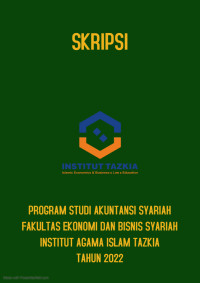Electronic Resource
SHARIA ACCOUNTING FOR PERSONAL FINANCE LITERACY AND ISLAMIC FINANCIAL WELL-BEING OF GIG ECONOMY WORKERS
Purpose – The main objective of this study is to describe and analyze the
correlation of Islamic accounting literacy for personal finance on financial
attitudes and behavior on the level of welfare of gig economy workers. Where in
analyzing this the author uses one exogenous latent variable (sharia accounting
literacy) and three endogenous latent variables (financial attitude, financial
behavior, and financial well being).
Design / methodology / approach – Using the Partial Least Squares – Structural
Equation Modeling (PLS-SEM) method and the data will be processed with the
Smart PLS application. The use of PLS-SEM is also used to expand existing
theories with the advantage of being able to estimate measurement models and
structural models simultaneously.
Findings - The author found that the influence of the SAL (Sharia Accounting
Literacy) variable on the FA (Financial Attitudes) variable was 12.8% and the
remaining 87.2% was influenced by other variables outside of this study. Through
this study, it was again found that there was a positive relationship between SAL
(Sharia Accounting Literacy) and FA (Financial Attitudes) variables on FB
(Financial Behavior) of 48.2% and the remaining 51.8% was influenced by other
variables outside of this study. . Finally, the results showed that the influence of
the FA (Financial Attitudes) and FB (Financial Behavior) variables on FWB
(Financial Well Being) was 48.1% and the remaining 51.9% was influenced by
other variables outside of this study.
Availability
Detail Information
- Series Title
-
-
- Call Number
-
REF 332.024008598 SAP s
- Publisher
- Bogor : IAI Tazkia., 2022
- Collation
-
-
- Language
-
English
- ISBN/ISSN
-
NIM.18102079
- Classification
-
332.024008598
- Content Type
-
-
- Media Type
-
-
- Carrier Type
-
-
- Edition
-
-
- Subject(s)
- Specific Detail Info
-
-
- Statement of Responsibility
-
Riski Agung Saputra
Other version/related
No other version available
File Attachment
Comments
You must be logged in to post a comment

 Computer Science, Information & General Works
Computer Science, Information & General Works  Philosophy & Psychology
Philosophy & Psychology  Religion
Religion  Social Sciences
Social Sciences  Language
Language  Pure Science
Pure Science  Applied Sciences
Applied Sciences  Art & Recreation
Art & Recreation  Literature
Literature  History & Geography
History & Geography